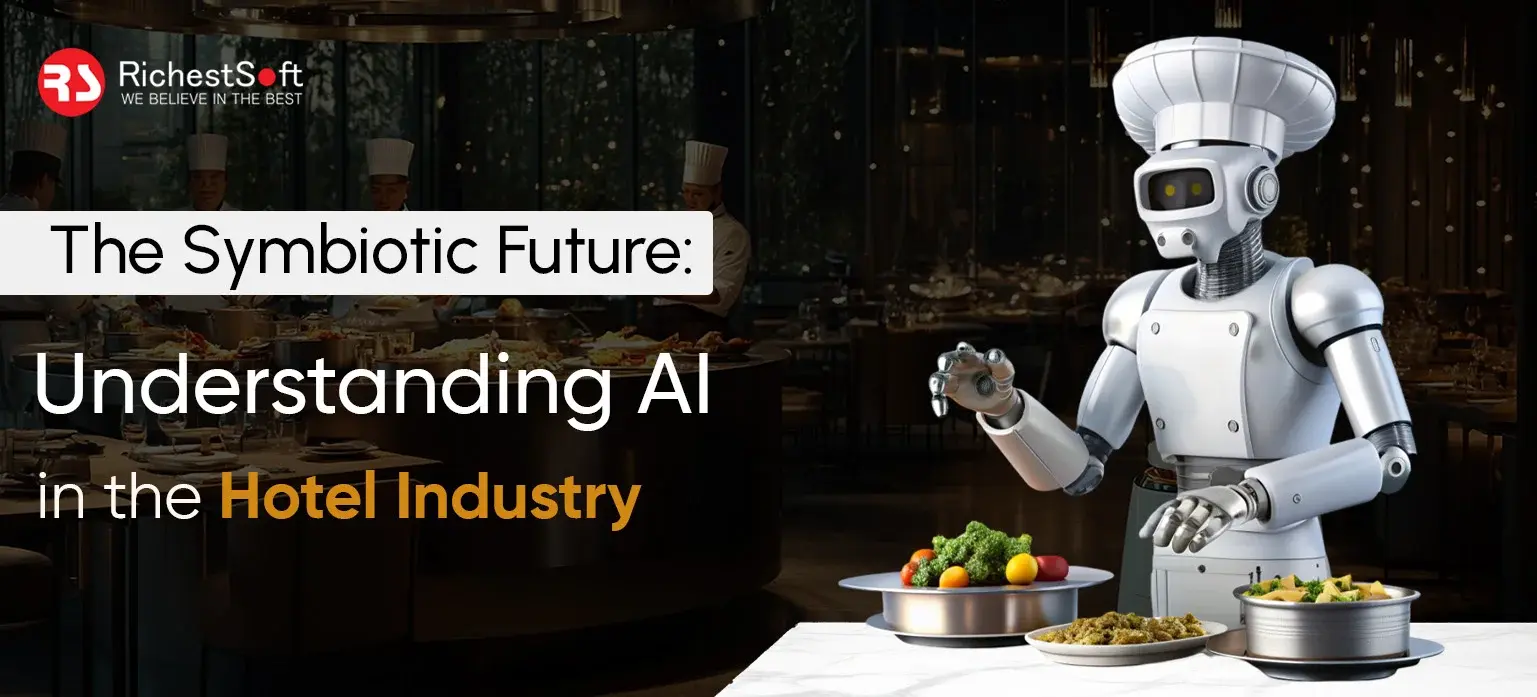December 12, 2024
Managing hotel systems and finding relevant data no longer seemed like locating a needle in a haystack.
The hospitality industry has shifted from having little data to being overwhelmed with information. This creates a new challenge: more commercial data is available than humans can analyze effectively.
As a result, the industry is embracing automation to overcome these challenges. By integrating AI into hotel booking engine software development, hoteliers can focus on what truly matters, eliminate unnecessary tasks, and enhance profitability.
The global AI market in the hotel industry is expected to grow significantly, reaching a projected size of US $70.32 billion by 2031.
AI in the hotel sector handles routine tasks, allowing your team to assist guests amiably. This next-gen technology sifts through data drowning, sufficing up insights and streamlining operations to stay ahead of the competitive crowd.
AI doesn’t just help hotels grow; it redefines what growth means in a landscape where agility and innovation are critical.
How?
Let’s find out in this blog post.
AI in the Hotel Industry: A Closer Look
AI improves productivity, personalization, and guest satisfaction across hospitality. Understanding AI’s role is crucial to consider AI in this field as innovation and guest-focused approaches become more important.
- AI Personalizing Guest Experience
AI-powered guest profiles and recommendation systems allow hotels to personalize amenities, services, and promotions. Chatbots and virtual assistants respond to queries, tailor recommendations, and offer immediate assistance.
- AI Enhancing Customer Service
AI tools like sentiment analysis and natural language processing can revolutionize hotel customer service. Staff can use AI to analyze guest feedback and emotions, identify areas for improvement, and quickly address concerns.
- AI in Revenue Management and Marketing
Hotel managers can use AI to customize marketing messages, find lucrative niches, and modify prices in real-time. AI-driven revenue management and marketing strategies have a positive outlook on the future of hospitality and present a viable route for expansion and profitability.
- AI Enhancing Safety and Security
AI technologies are essential for enhancing hotel security and safety. AI-enabled surveillance system’s ability to identify possible security risks, such as illegal access or questionable activity, instills confidence and assurance. Facial recognition technology can also improve passenger identification and expedite check-in procedures.
Real-Time Examples of AI in the Hotel Industry
AI is helping hotels improve operations, increase profits, and enhance efficiency. It enables customized visitor experiences without overburdening employees. AI expands profitability by automating front desk operations, data-driven decision-making, and optimizing real-time pricing strategy.
Here are three real-world examples of AI in action in hotels:
- AI Bartender at Wyndham: A few Wyndham properties near Disney World now have AI bartenders. This creative bartender improves the visitor experience by creating cocktails, conversing with customers, and using facial recognition to recall their preferences.
- IHG’s AI Travel Agents: IHG and Google collaborated to develop an AI travel planner. This application assists tourists in planning their journeys based on their preferences and historical behavior to increase direct bookings and hotel upselling opportunities.
- Airbnb- Using AI for Guest Communication: AI-driven Airbnb improves the user experience. AI chatbots answer real-time questions, offering round-the-clock customer service. Airbnb uses AI to prevent fraud, guaranteeing safe transactions by spotting questionable activity. Experience the AI-driven Airbnb clone app development for better exposure!
AI Use Cases in Hotels
AI is transforming the hotel and hospitality industry, embedding itself across various operations. Here are 27 exciting use cases of AI app development in the hotel industry:
- Chatbots: Helpful for booking, check-ins, and inquiries. About 70% of guests find them useful.
- Voice-Activated Devices: Smart speakers and kiosks offer recommendations and room controls. 40% of hotel leaders see them as critical innovations.
- Personalized Recommendations: AI analyzes data to tailor offers. This boosts revenue and guest satisfaction.
- Smart Room Customization: Guests want high-tech rooms. AI adjusts lighting, temperature, and even mattress firmness.
- Robotic Process Automation (RPA): Robotic process automation (RPA) enhances system workflow by automating repetitive processes.
- Energy Management: AI helps hotels optimize energy use, lowering expenses and fostering sustainability.
- Pricing Management: AI utilizes data analysis to augment pricing tactics that maximize revenue and occupancy.
- Predictive Maintenance: Predictive maintenance reduces downtime and repair expenses by using AI to predict equipment problems.
- Facial Recognition: Expedites payments and check-ins while improving security.
- Automated Surveillance: Automated surveillance reduces personnel workload by effectively monitoring the property.
- Targeted Marketing: AI helps segment customers for personalized campaigns, increasing bookings.
- Sentiment Analysis: AI analyzes guest feedback to improve services and manage online reputation.
- Virtual Tours: Engaging AI-driven tours boosts confidence in bookings, especially among younger guests.
- Augmented Reality (AR): With interactive elements and real-time information, augmented reality (AR) improves visitor experiences.
- Automated Check-ins: By expediting check-in, smart kiosks lower front desk employees’ requirements.
- Real-Time ID Verification: Speeds up identity checks for contactless services.
- Smart Kitchens: AI optimizes food service in kitchens, ensuring quality and efficiency.
- Robot Cooking and Delivery: AI-powered robots speed up room service, expanding guest options.
- Automated Cleaning: AI coordinates cleaning schedules based on real-time data.
- Robot Cleaners: Automate routine tasks, allowing staff to focus on complex cleaning.
- Event Planning Tools: Streamlines logistics and enhances virtual experiences for events.
- Crowd Management: Monitors crowd density to ensure safety and optimize staffing.
- Waste Reduction: AI analyzes waste to improve recycling and cut costs.
- Energy Optimization: Finding methods to increase energy efficiency and investigating renewable sources is known as energy optimization.
- Personalized Rewards: Increases loyalty by providing benefits specific to visitors’ preferences.
- Predictive Loyalty Engagement: Nudges guests to book or spend more with timely offers.
- Real-Time Translation: Breaks language barriers, enhancing communication with international guests.
How is AI Transforming Guest Experiences in the Hotel and Hospitality Sector?
AI transforms and enhances the hotel industry by simplifying guest experiences. Here are a few great AI uses in the hotel industry:
- AI Robot Concierge
Hotels are using AI-powered robot concierges to enhance guest interactions. For instance, Hilton’s Connie, built on IBM’s Watson, can chat, check guests in and out, and learn from conversations. It connects easily to voice services, automating tasks and boosting service quality.
- Chatbots & Virtual Assistants
Chatbots are valuable AI integration services for existing platforms. They respond to visitor questions promptly and around the clock using chat platforms. With Natural Language Processing, they handle everything from problem-solving to meal orders, making communication seamless and efficient.
- Hassle-Free Booking
Booking a stay can be a hassle, but AI simplifies the process. Brilliant website features help guests find dates and make reservations effortlessly. Virtual travel assistants enhance customer experience, ensuring smoother bookings with minimal effort.
- Making Reviews Actionable
Guests love sharing feedback online, and AI helps hotels tap into that data. Machine learning analyzes reviews across platforms like TripAdvisor, revealing customer sentiments. This allows hotels to adapt their services based on real-time feedback. Business enthusiasts kick off their new venture with the development of a Tripadvisor clone app for a quick launch in the market.
- Prediction Analysis & Dynamic Pricing
AI and machine learning can predict demand based on seasonal trends and market changes. They adjust pricing automatically, considering factors like weather and local events. This smart pricing strategy maximizes revenue and keeps hotels competitive.
- Automation & Efficiency
AI helps smaller hotels compete with larger companies by streamlining operations. Staff members may concentrate on providing excellent guest service as automated systems take care of check-ins, housekeeping, and room assignments. This boosts efficiency and enhances overall guest satisfaction.
Benefits of AI in the Hospitality Industry
Here are some key advantages of using artificial intelligence in hotel and hospitality:
- Streamlined Communication
AI helps automate tasks like mobile check-ins and wake-up calls while maintaining a personal touch. For example, Wyndham Hotels uses AI to answer common guest questions quickly via text, allowing staff to focus on personalized service when needed.
- Effective Resource Allocation
AI optimizes staffing by predicting busy times, ensuring hotels are well-staffed to meet demand. For instance, if housekeeping is needed during certain hours, AI can schedule extra staff to clean rooms promptly, improving guest satisfaction.
- Boosted Staff Productivity
AI tools help hotels manage staffing levels efficiently, especially during labor shortages. For example, AI can predict busy nights, allowing hotels to schedule more staff. AI messaging tools can also handle guest inquiries, freeing up front desk staff for other tasks.
- Personalized Guest Experiences
AI enables hotels to provide tailored experiences without losing the human touch. It can craft personalized responses to reviews, prioritize urgent requests, and suggest tailored recommendations based on guest preferences stored in a database.
- Better Forecasting
AI enhances revenue and expense predictions. For example, it can optimize maintenance schedules to prevent downtime, adjust room prices based on demand, and improve overall revenue management by analyzing multiple data sources.
- Targeted Marketing
AI can analyze guest data to create more effective marketing campaigns. It identifies customer segments likely to engage with specific offers, increasing conversion opportunities.
- Sustainability and Energy Efficiency
AI innovative technology helps manage room energy use by monitoring HVAC systems and lighting based on occupancy. This approach not only supports environmental goals but also reduces costs.
- Improved Revenue Management
Hospitality companies are using AI analytics to enhance their revenue management. By analyzing financial data and past trends, AI helps hotels set optimal pricing strategies to boost occupancy, cash flow, and profits, whether in peak or off-season. It can also identify opportunities to increase sales across multiple channels.
- 24/7 Guest Support
AI chatbot development leads to the inception of powerful virtual assistants with 24/7 support, delivering quick responses and personalized help, even outside regular business hours.
The Bottom Line
Hotel chains embrace artificial intelligence (AI) to boost efficiency and enhance guest experiences. AI streamlines operations, improving inventory management and staff scheduling, saving time and cutting costs. It also personalizes stays with tailored recommendations, chatbots, and recognition technology. This leads to happier guests and stronger loyalty, driving business success. As AI evolves, hotels will adopt these tools for even better operations and more personalized experiences.
Wish to upgrade your hotel operations with AI for enhanced performance, security, and scalability?
Team RichestSoft is adept at optimizing hotel digital addresses for improved guest experiences. Let’s connect for more!
 +1 315 210 4488
+1 315 210 4488 +91 99888 06489
+91 99888 06489









